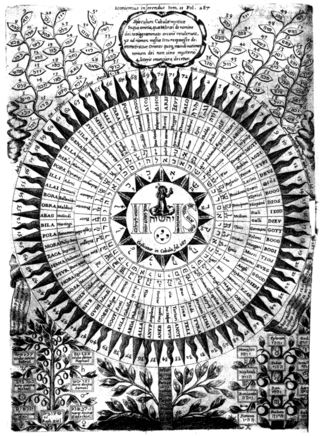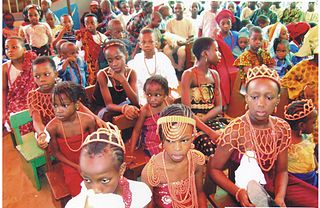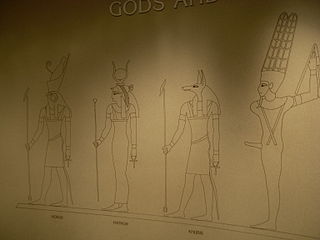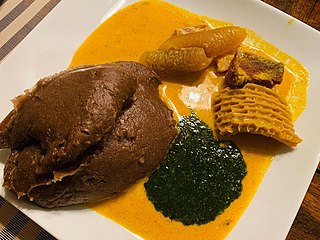
Odinani or Odinala, also known as Omenala, Omenana, Odinana, Ọmenani, Ọdịlalị, or Ọdịlala, are the traditional cultural beliefs and practices of the Igbo people of south east Nigeria. These terms, as used here in the Igbo language, are synonymous with the traditional Igbo "religious system" which was not considered separate from the social norms of ancient or traditional Igbo societies. Theocratic in nature, spirituality played a huge role in their everyday lives. Although it has largely been supplanted by Christianity, the indigenous belief system remains in strong effect among the rural and village populations of the Igbo, where it has at times influenced the colonial religions. Odinani is a pantheistic and polytheistic faith, having a strong central deity at its head. All things spring from this deity. Although a pantheon of other gods and spirits, these being Ala, Amadiọha, Anyanwụ, Ekwensu, Ikenga, exists in the belief system, as it does in many other Traditional African religions, the lesser deities prevalent in Odinani serve as helpers or elements of Chukwu, the central deity.
Olokun is an orisha spirit in Yoruba religion. Olokun is believed to be the parent of Aje, the orisha of great wealth and of the bottom of the ocean. Olokun is revered as the ruler of all bodies of water and for the authority over other water deities. Olokun is highly praised for their ability to give great wealth, health, and prosperity to their followers. Communities in both West Africa and the African diaspora view Olokun variously as female, male, or androgynous.

Orishas are spirits that play a key role in the Yoruba religion of West Africa and several religions of the African diaspora that derive from it, such as Cuban, Dominican and Puerto Rican Santería and Brazilian Candomblé. The preferred spelling varies depending on the language in question: òrìṣà is the spelling in the Yoruba language, orixá in Portuguese, and orisha, oricha, orichá or orixá in Spanish-speaking countries.

There are various names of God, many of which enumerate the various qualities of a Supreme Being. The English word god is used by multiple religions as a noun to refer to different deities, or specifically to the Supreme Being, as denoted in English by the capitalized and uncapitalized terms God and god. Ancient cognate equivalents for the biblical Hebrew Elohim, one of the most common names of God in the Bible, include proto-Semitic El, biblical Aramaic Elah, and Arabic ilah. The personal or proper name for God in many of these languages may either be distinguished from such attributes, or homonymic. For example, in Judaism the tetragrammaton is sometimes related to the ancient Hebrew ehyeh. It is connected to the passage in Exodus 3:14 in which God gives his name as אֶהְיֶה אֲשֶׁר אֶהְיֶה, where the verb, translated most basically as "I am that I am" or "I shall be what I shall be", "I shall be what I am" In the Hebrew Bible, YHWH, the personal name of God, is revealed directly to Moses. Correlation between various theories and interpretation of the name of "the one God", used to signify a monotheistic or ultimate Supreme Being from which all other divine attributes derive, has been a subject of ecumenical discourse between Eastern and Western scholars for over two centuries. In Christian theology the word is considered a personal and a proper name of God. On the other hand, the names of God in a different tradition are sometimes referred to by symbols. The question whether divine names used by different religions are equivalent has been raised and analyzed.

The Yoruba religion, or Isese, comprises the traditional religious and spiritual concepts and practice of the Yoruba people. Its homeland is in present-day Southwestern Nigeria, which comprises the majority of Oyo, Ogun, Osun, Ondo, Ekiti, Kwara and Lagos States, as well as parts of Kogi state and the adjoining parts of Benin and Togo, commonly known as Yorubaland. It shares some parallels with the Vodun practiced by the neighboring Fon and Ewe peoples to the west and to the religion of the Edo people and Igala people to the east. Yoruba religion is the basis for a number of religions in the New World, notably Santería, Umbanda, Trinidad Orisha, and Candomblé. Yoruba religious beliefs are part of Itàn (history), the total complex of songs, histories, stories, and other cultural concepts which make up the Yoruba society.

Edo, officially known as Edo State, is a state located in the South-South geopolitical zone of the federal republic of Nigeria. As of 2006 National population census, the state was ranked as the 24th populated state (3,233,366) in Nigeria. The state population figures is expected to be about 4,777,000 in 2022. Edo State is the 22nd largest State by landmass in Nigeria. The state's capital and largest city, Benin City, is the fourth largest city in Nigeria, and the centre of the country's rubber industry. Created in 1991 from the former Bendel State, is also known as the heart beat of the nation. Edo State borders Kogi State to the northeast, Anambra State to the east, Delta State to the southeast and southsouth and Ondo State to the west.
The Edoid languages are a few dozen languages spoken in Southern Nigeria, predominantly in the former Bendel State. The name Edoid derives from its most widely spoken member, Edo, the language of Benin City, which has 25 million native and secondary speakers.
The following list consists of notable concepts that are derived from Hindu culture and associated cultures traditions, which are expressed as words in Sanskrit or other Indic languages and Dravidian languages. The main purpose of this list is to disambiguate multiple spellings, to make note of spellings no longer in use for these concepts, to define the concept in one or two lines, to make it easy for one to find and pin down specific concepts, and to provide a guide to unique concepts of Hinduism all in one place.

The Esan people (Esan: are an ethnic group of southern Nigeria who speak the Esan language. The Esan are traditionally known to be agriculturalists, trado-medical practitioners, mercenary warriors and hunters. They cultivate palm trees, Irvingia gabonensis, Cherry, bell pepper coconut, betel nut, kola nut, black pear, avocado pear, yams, cocoyam, cassava, maize, rice, beans, groundnut, bananas, oranges, plantains, sugar cane, tomato, potato, okra, pineapple, paw paw, and various vegetables.

The traditional beliefs and practices of African people are highly diverse, including various ethnic religions. Generally, these traditions are oral rather than scriptural and are passed down from one generation to another through folk tales, songs, and festivals, and include beliefs in spirits and higher and lower gods, sometimes including a supreme being, as well as the veneration of the dead, and use of magic and traditional African medicine. Most religions can be described as animistic with various polytheistic and pantheistic aspects. The role of humanity is generally seen as one of harmonizing nature with the supernatural.

The Edopeople, sometimes referred to as the Bendel people, are an Edoid-speaking ethnic group. The oredo who predominantly reside in 7 southern local government areas of the State of Edo, Nigeria are known as Benin. They are speakers of the bini language and are the descendants of the founders of the Benin Kingdom Ogiso Igodo. They are closely related to other southern Nigerian tribes, such as the Esan, Igbanke, the Etsakọ, the Isoko, and the Urhobo.

Uromi is a city located in north-eastern Esan, a sub-ethnic group of the Edo people in Edo state, Nigeria. At various points in Uromi's history, the city and people have been an important part of the Benin Empire.

Polytheism is the belief in multiple deities, which are usually assembled into a pantheon of gods and goddesses, along with their own religious sects and rituals. Polytheism is a type of theism. Within theism, it contrasts with monotheism, the belief in a singular God who is, in most cases, transcendent. In religions that accept polytheism, the different gods and goddesses may be representations of forces of nature or ancestral principles; they can be viewed either as autonomous or as aspects or emanations of a creator deity or transcendental absolute principle, which manifests immanently in nature. Polytheists do not always worship all the gods equally; they can be henotheists, specializing in the worship of one particular deity, or kathenotheists, worshiping different deities at different times.

Akan religion comprises the traditional beliefs and religious practices of the Akan people of Ghana and eastern Ivory Coast. Akan religion is referred to as Akom Although most Akan people have identified as Christians since the early 20th century, Akan religion remains practiced by some and is often syncretized with Christianity. The Akan have many subgroups, so the religion varies greatly by region and subgroup. Similar to other traditional religions of West and Central Africa such as West African Vodun, Yoruba religion, or Odinani, Akan cosmology consists of a senior god who generally does not interact with humans and many gods who assist humans.
The Urhobos are people located in southern Nigeria, near the northwestern Niger Delta.
Ehi is the name of a personal spirit in some West African religious beliefs, especially in Edo Nigeria and Benin. Ehi means "genius", but it also means "angel" in some Nigerian languages and refers to a spirit possessing a man, similar to a guardian angel. Furthermore, Ehi means "gift" in the Idoma language of Nigeria.
Igbe religion, popularly known as Igbe was founded by Ubiecha Etarakpo in 1858 and has its headquarters at 11, Egbo Street, Kokori Inland, Ethiope East Local Government Area, Delta State, Nigeria.

Esanland, is a cultural region located in Edo State, Nigeria. It is composed of five Local Government Areas in Edo State. Esanland lies west of the banks of the Niger River. It is bordered by Kogi State, Delta State, Edo South Senatorial District, and Edo North Senatorial District. Esanland covers about 2,800 square kilometers and is home to over half a million people. The Esan people and culture of Esanland are generally homogenous.

Edo traditional food consists of dishes or food items common among the people of Edo State. The State is home to various ethnic groups including the Binis, Ishan (Esan), Afemai, Etsako, Uzebba Iuleha people [Owan] and others. The Traditional food found among these people usually involves soup and swallow. 'swallow' is a term for Nigerian meals that are taken with soup and ingested without chewing.












